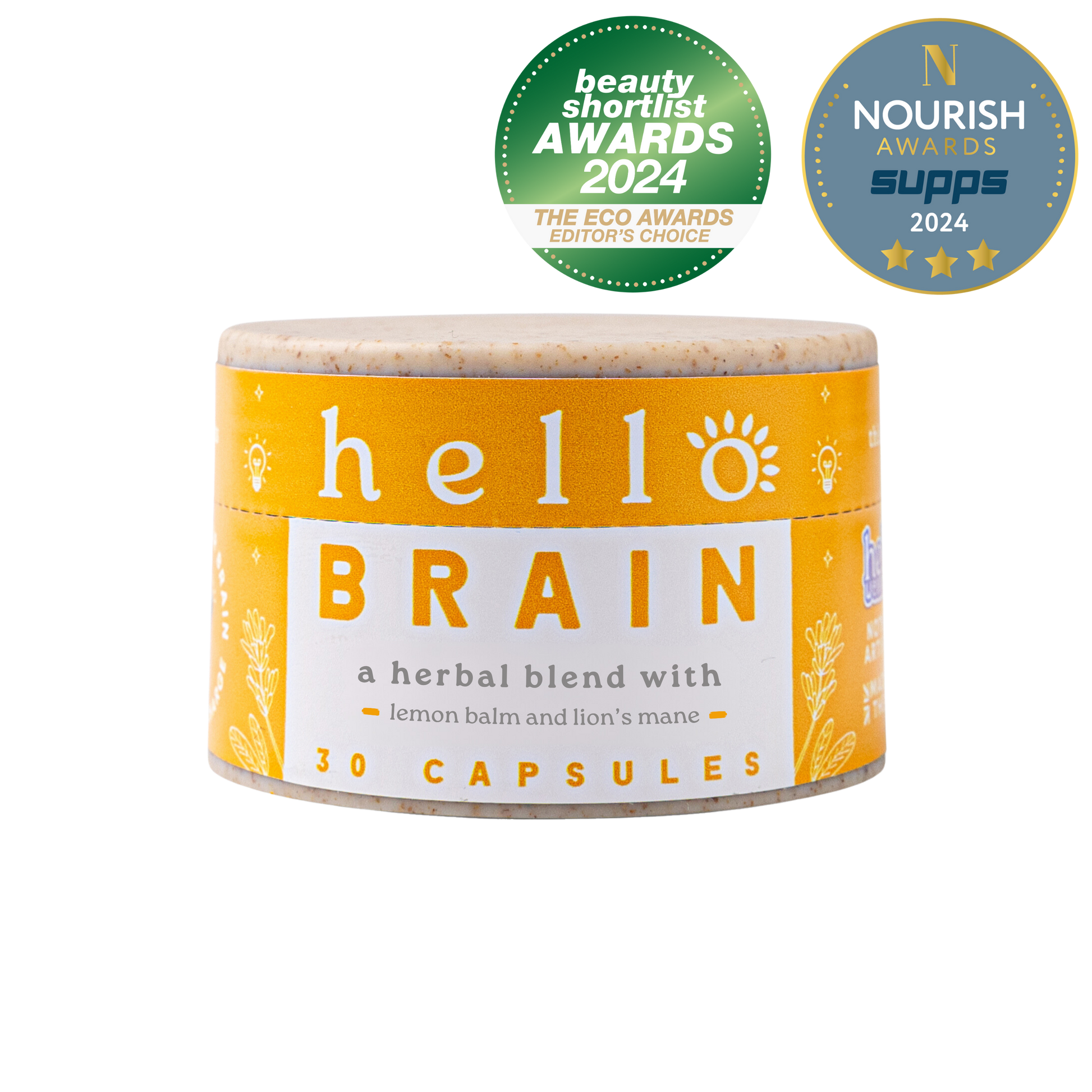Natural Remedies for Brain Fog
Do you ever feel like your mind is in a haze? Like you're trying to think through a thick fog that won’t lift? This feeling is often referred to as brain fog.
Brain fog isn’t a medical condition itself, but rather a symptom of an underlying health issue. Brain fog can make it difficult to concentrate, recall information or feel mentally sharp. Fortunately, natural remedies and lifestyle adjustments can help you clear brain fog and improve cognitive function.
At Hello Wellness, we specialise in creating expertly formulated herbal remedies designed to support your health and well-being. In this guide, we’ll explore what brain fog is, its causes, and the most effective natural treatments to enhance and improve mental clarity, helping you feel at your best.

What is Brain Fog?
Brain fog is often characterised by confusion, lack of focus, poor memory, and mental fatigue.
It can feel like your thoughts are sluggish, and tasks that once felt simple may seem overwhelming. Many people experience brain fog due to factors like stress, poor sleep, diet, and underlying health conditions.
Common Symptoms of Brain Fog Include:
- Difficulty concentrating
- Lack of focus
- Short-term memory problems
- Mental fatigue or sluggishness
- Lack of motivation or mental sharpness
- Trouble processing information
Common Causes of Brain Fog
Understanding what contributes to brain fog is the first step in overcoming it.
Here are some of the primary causes:
1. Poor Sleep
Quality sleep is essential for brain function. Lack of restorative sleep can lead to cognitive impairment, memory issues, and mental fatigue.
2. Nutrient Deficiencies
Your brain needs essential nutrients like B vitamins, omega-3 fatty acids, and antioxidants to function optimally. Deficiencies can contribute to brain fog and cognitive decline.
3. Chronic Stress
Prolonged stress increases cortisol levels, which can negatively impact memory, concentration, and overall mental clarity.
4. Diet & Blood Sugar Imbalances
Diets high in processed foods, sugar, and refined carbohydrates can cause fluctuations in blood sugar levels, leading to mental fatigue and sluggish thinking.
5. Dehydration
Even mild dehydration can affect focus and cognitive function. The brain needs adequate water to stay sharp.
6. Inflammation & Gut Health
Chronic inflammation and an unhealthy gut microbiome have been linked to cognitive dysfunction. Supporting gut health can improve mental clarity.
7. Hormonal Imbalances
Changes in hormones, such as those associated with thyroid dysfunction or menopause, can contribute to brain fog.
Signs Your Brain Needs Some Support
Persistent Brain Fog
Brain fog is a common but frustrating issue that affects cognitive clarity, memory, and mental sharpness. It can stem from various causes, including poor sleep, high stress levels, nutritional deficiencies, or underlying health conditions such as thyroid disorders or chronic inflammation.
Dehydration and excessive sugar intake may also contribute to sluggish thinking. Addressing brain fog often involves improving sleep hygiene, managing stress through mindfulness or exercise, and ensuring adequate intake of brain-boosting nutrients like B vitamins, omega-3 fatty acids, and antioxidants. Staying hydrated, reducing processed foods, and engaging in regular physical activity can also enhance mental clarity and overall brain function.
Difficulty Concentrating
Struggling to focus can be a sign of multiple underlying factors, including insufficient sleep, chronic stress, or an imbalanced diet lacking essential nutrients. Deficiencies in omega-3 fatty acids, iron, or magnesium can impair cognitive function, making it harder to maintain attention. Excessive screen time, lack of exercise, and high levels of cortisol due to stress can further exacerbate concentration difficulties.
Simple lifestyle changes such as prioritizing rest, reducing distractions, and incorporating brain-supportive foods like leafy greens, nuts, and fatty fish can help improve focus. Additionally, engaging in mindfulness practices, such as meditation or deep breathing exercises, may enhance cognitive endurance over time.
Forgetfulness
Frequent forgetfulness, such as misplacing items or struggling to recall details, may indicate deficiencies in key brain-supporting nutrients like B vitamins, vitamin D, and antioxidants. Chronic stress, lack of sleep, and dehydration can also impair memory function, as they disrupt neural communication and reduce brain plasticity.
Addressing forgetfulness often involves optimizing sleep quality, staying hydrated, and consuming a nutrient-rich diet that includes berries, nuts, dark chocolate, and fatty fish. Regular mental exercises, such as puzzles, reading, or learning new skills, can also stimulate the brain and improve memory retention. Reducing alcohol intake and managing stress effectively can further enhance cognitive sharpness.
Mental Fatigue
Feeling mentally drained, even after minimal cognitive effort, can result from chronic stress, nutrient deficiencies, or poor lifestyle habits. Inadequate sleep, dehydration, and excessive consumption of processed foods can contribute to sluggish brain function. Mental fatigue is also linked to overworking the brain without sufficient breaks, leading to burnout and decreased productivity.
To combat this, it’s crucial to maintain a balanced diet with whole foods rich in essential nutrients, stay properly hydrated, and establish healthy sleep routines. Incorporating short breaks, physical activity, and relaxation techniques like meditation or deep breathing can further reduce mental exhaustion and improve overall cognitive resilience.
Mood Swings
Frequent mood swings and irritability are often linked to hormonal imbalances, stress, poor sleep, and inadequate nutrition. Fluctuations in serotonin, dopamine, and cortisol levels can significantly impact emotional regulation. A diet low in healthy fats, proteins, and micronutrients can contribute to unstable moods.
To stabilize emotions, focus on consuming mood-enhancing foods such as complex carbohydrates, omega-3-rich fish, and magnesium-rich leafy greens. Regular physical activity, sufficient sleep, and mindfulness techniques can also help regulate stress hormones and promote emotional balance. Avoiding excessive caffeine, alcohol, and processed foods can further support mood stability and overall mental well-being.
Reduced Motivation
A persistent lack of motivation may be tied to low dopamine levels, which are influenced by factors like chronic stress, poor diet, and lack of physical activity. Nutrient deficiencies, particularly in iron, B vitamins, and omega-3s, can also impact dopamine production, leading to decreased drive and enthusiasm.
Developing a routine that includes goal-setting, adequate rest, and a balanced diet can help boost motivation. Engaging in rewarding activities, practicing self-care, and maintaining social connections can further enhance dopamine levels. Regular exercise, particularly aerobic activities, is known to naturally increase motivation by stimulating the release of endorphins and neurotransmitters essential for drive and focus.
Herbs for Brain Fog
-

Rosemary
RosemaryRosemary (Rosmarinus officinalis) is a fragrant, evergreen herb with a rich history in traditional medicine and culinary use. Known for its ability to enhance memory, support cognitive function, and promote overall well-being, Rosemary has been a staple in herbal remedies for centuries.
-

Oat Straw
Oat StrawOat straw, often referred to as Avena Sativa, has been used for centuries as a natural remedy to support brain function, boost energy, and promote overall well-being. Known for its ability to enhance cognitive performance, balance mood, and support nervous system health, this powerful herb is gaining recognition as a must-have for those looking to improve mental clarity and vitality.
-
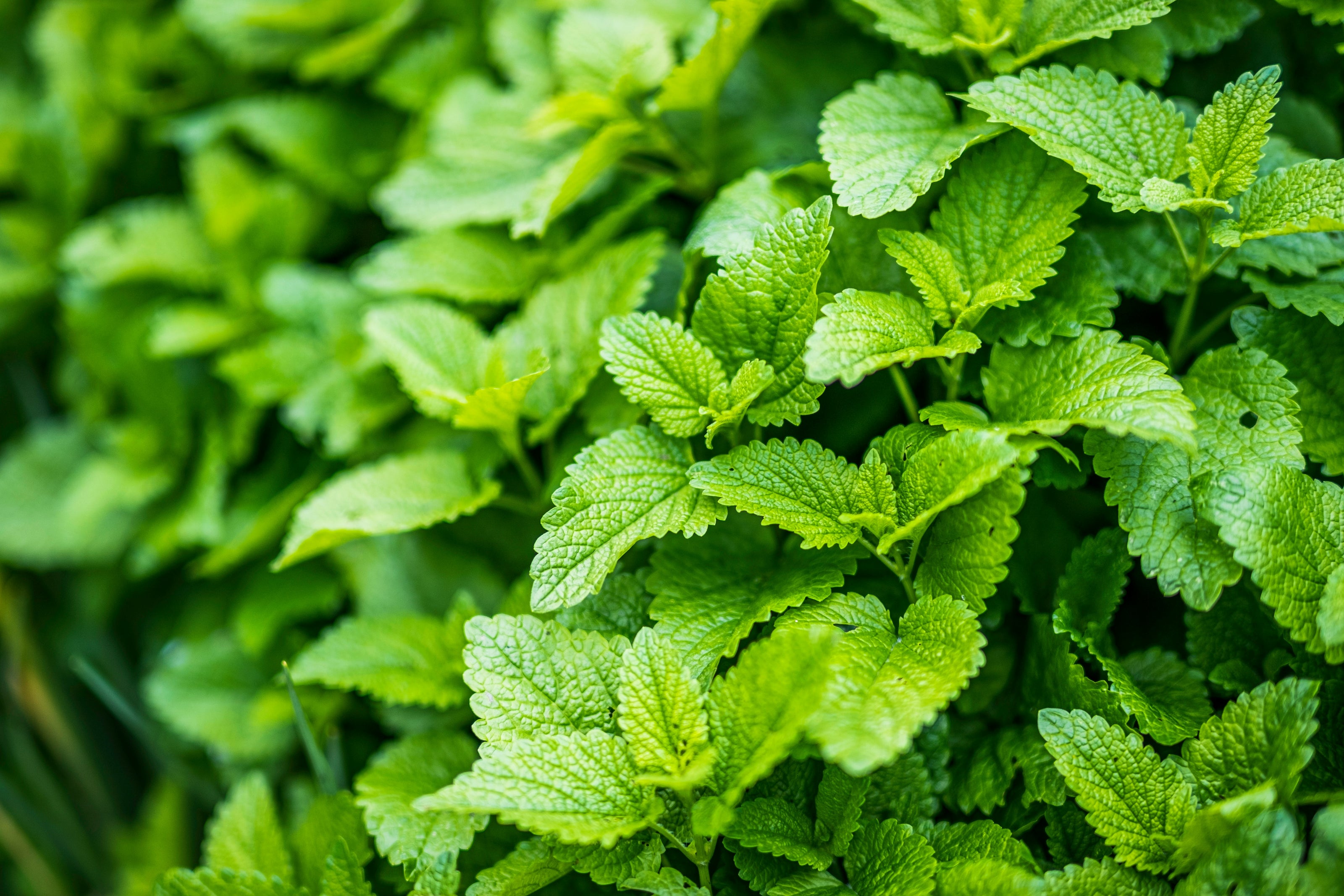
Lemon Balm
Lemon BalmLemon Balm (Melissa officinalis) is a fragrant herb from the mint family that has been used for centuries to promote relaxation, improve cognitive function, and support overall well-being. Known for its fresh, citrusy scent and calming properties, Lemon Balm is a powerful botanical that enhances mood, reduces stress, and supports mental clarity.
-
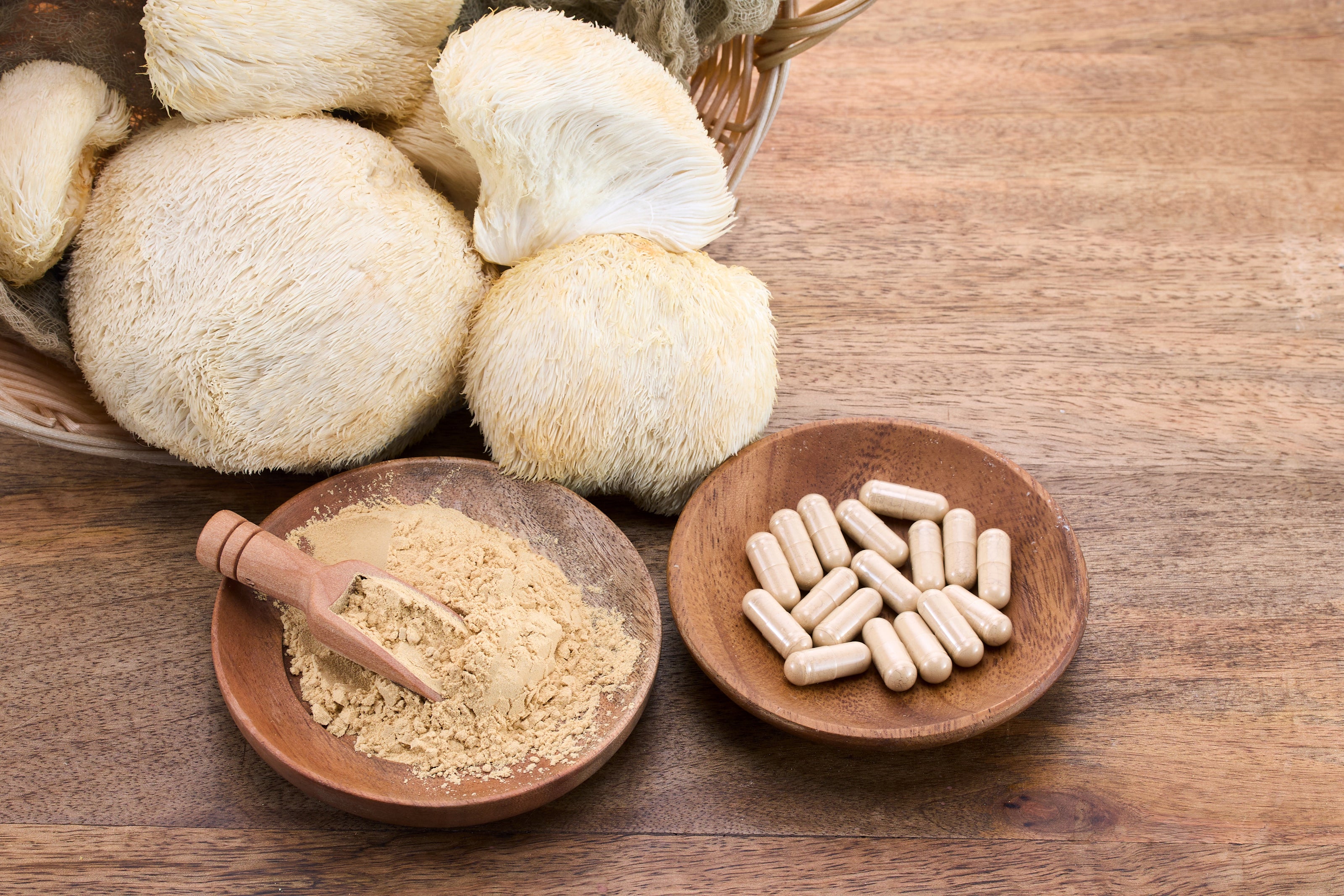
Lion's Mane
Lion's ManeLion’s Mane (Hericium erinaceus) is a unique, shaggy white mushroom that has been revered in traditional medicine for centuries. Often called "the smart mushroom," it is well known for its powerful cognitive and nerve-regenerating properties. Modern research has confirmed its ability to support brain health, memory, focus, and even mood regulation.
Natural Remedies for Brain Fog
The good news is that brain fog is often reversible with lifestyle adjustments and targeted natural remedies. Here are some easy ways you can naturally boost your brain function:

Prioritise Quality
Sleep
A consistent sleep routine is essential for cognitive function. Aim for 7–9 hours of uninterrupted sleep each night by maintaining a consistent sleep schedule, reducing blue light exposure in the evening, and practicing relaxation techniques before bed.
Herbal sleep aids like valerian root and chamomile can help promote restful sleep, allowing your brain to recharge and function optimally the next day.

Adopt a Brain-Boosting
Diet
Eating a nutrient-dense diet is crucial for mental clarity. Focus on consuming omega-3-rich foods such as salmon, flaxseeds, and walnuts, which support cognitive function.
Incorporate antioxidant-rich fruits and vegetables like leafy greens and berries to reduce oxidative stress in the brain. Minimize processed foods, refined sugars, and unhealthy fats, as these can cause blood sugar spikes and contribute to brain fog. Supporting gut health with probiotics and fermented foods also plays a key role in mental sharpness.

Drink Plenty Of
Water
Dehydration is one of the most overlooked causes of brain fog. Even mild dehydration can impair focus and memory. Drinking at least 8 glasses of water daily is essential for optimal brain function.
Additionally, reducing caffeine and alcohol consumption can help prevent dehydration-related cognitive decline. Herbal teas and electrolyte-rich drinks can provide additional hydration support for improved mental clarity.

Manage
Stress
Chronic stress can lead to high cortisol levels, which negatively impact memory and concentration.
Mindfulness practices such as meditation, deep breathing exercises, and journaling can help lower stress levels and enhance focus. Regular physical activity is another effective way to reduce stress, as it releases endorphins that support mental well-being.
Adaptogenic herbs have been shown to balance cortisol levels and improve resilience to stress, helping to clear brain fog.

Get Regular
Exercise
Physical movement is essential for brain health. Aerobic exercises like walking, running, and swimming increase blood flow to the brain, improving cognitive function.
Strength training also plays a role in brain health by enhancing neural connections. Additionally, yoga combines movement with mindfulness, making it an excellent option for reducing stress while promoting mental clarity.
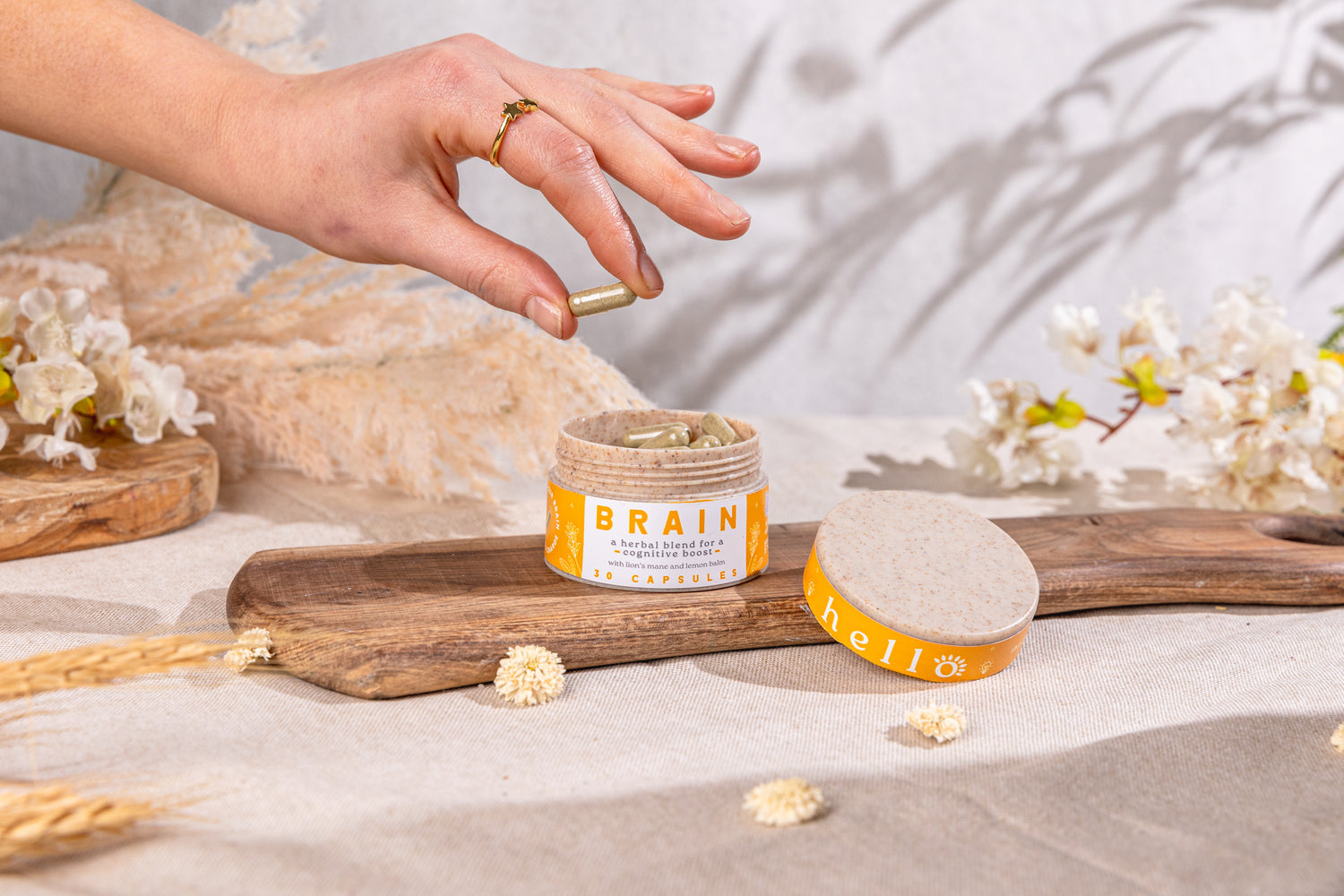
Use Natural
Supplements
Certain herbs and supplements have been scientifically proven to enhance cognitive function. Lion’s Mane Mushroom supports nerve regeneration and cognitive function by stimulating brain-derived neurotrophic factor (BDNF).
Magnesium helps reduce stress and supports neurotransmitter function, while a Vitamin B complex is crucial for energy production and mental alertness.
At Hello Wellness, we offer expertly formulated brain-boosting supplements that combine these powerful ingredients to help you think more clearly and stay sharp.
Other Natural Ways to Combat Brain Fog
Omega 3 Fatty Acids
Omega-3 fatty acids are essential for brain health, playing a crucial role in cognitive function, memory retention, and emotional regulation. These healthy fats, primarily found in fatty fish, flaxseeds, and walnuts, help maintain the integrity of brain cell membranes and facilitate efficient communication between neurons. They also possess strong anti-inflammatory properties, reducing the risk of neurodegenerative diseases such as Alzheimer’s and Parkinson’s. Omega-3s, particularly DHA, support learning, focus, and mental clarity while potentially lowering the risk of depression and anxiety. Regular intake of omega-3s has been associated with improved mood stability, reduced brain fog, and enhanced cognitive resilience, making them an essential nutrient for overall brain function.
Antioxidants
Antioxidants protect the brain from oxidative stress, which can damage brain cells and contribute to cognitive decline. Free radicals, unstable molecules produced by stress, pollution, and poor diet, can accelerate brain aging and impair memory. Antioxidants such as vitamin C, vitamin E, and polyphenols neutralize these harmful molecules, preserving brain health. Found in berries, dark chocolate, green tea, and leafy greens, these compounds help enhance focus, learning ability, and mental energy. Antioxidants also support neuroplasticity, the brain’s ability to adapt and form new connections, which is vital for memory retention and cognitive flexibility. Incorporating antioxidant-rich foods into your diet can improve long-term brain health and reduce the risk of neurological diseases.
B Vitamins
B vitamins, particularly B6, B9 (folate), and B12, play a key role in brain function, energy production, and neurotransmitter synthesis. These vitamins help regulate homocysteine levels, an amino acid that, when elevated, is linked to cognitive decline and an increased risk of dementia. B vitamins support the production of serotonin and dopamine, which influence mood and motivation. A deficiency in B12, commonly found in vegetarians and older adults, can lead to brain fog, memory issues, and mood imbalances. Foods rich in B vitamins, such as eggs, leafy greens, and whole grains, can boost mental clarity and prevent cognitive decline. Supplementation may be beneficial for those with absorption issues or dietary restrictions.
Vitamin D
Vitamin D, often referred to as the “sunshine vitamin,” plays a crucial role in brain health, mood regulation, and cognitive performance. It helps support the production of neurotransmitters like serotonin, which affects mood, focus, and motivation. Low levels of vitamin D have been linked to increased risks of depression, brain fog, and neurodegenerative diseases. This vitamin also reduces inflammation in the brain, promoting overall neural health and cognitive longevity. While sunlight exposure is the primary source of vitamin D, dietary sources such as fatty fish, eggs, and fortified foods can help maintain adequate levels. Supplementation may be necessary for individuals with limited sun exposure or absorption difficulties.
Coconut Flour
Coconut flour, a gluten-free alternative to traditional wheat flour, offers brain health benefits due to its high fiber content, healthy fats, and essential nutrients. It is rich in medium-chain triglycerides (MCTs), which provide a quick and efficient energy source for the brain, supporting cognitive function and mental clarity. The fiber in coconut flour helps regulate blood sugar levels, preventing energy crashes that can impair focus and concentration. Additionally, it contains antioxidants that protect against oxidative stress and inflammation in the brain. Coconut flour’s low glycemic index makes it a brain-friendly option, reducing the risk of cognitive decline associated with high-sugar diets.
Blog Posts About Brain Health
-

Tips for Better Brain Health: January's Practitioner Plan of Action
Read about Brain HealthThis month, we’ve had the privilege of learning from Nutritional Therapist and Health Coach Sarah Elizabeth, whose mission to empower female leaders has inspired us all.
-

How to Stay Focused Naturally
How to Stay FocussedFeeling mentally foggy or struggling to concentrate? Too often, we turn to quick fixes like caffeine or sugar when we feel foggy or unfocused.
-

How to Eat to Support Your Brain: Boosting Focus and Memory Naturally
Read about Brain FoodFrom boosting memory to achieving sustained focus, this insightful guide from Nutritionist Sarah Elisabeth explores the essential nutrients, supportive herbs, and daily habits that naturally enhance brain health and energy.
Discover Hello Brain
Brain Fog FAQ
How long does it take to recover from brain fog?
The recovery time depends on the underlying cause or condition. Some people notice an improvement within days of making dietary or lifestyle changes, while others may take a few weeks to feel fully clear-headed.
Can brain fog be a symptom of a serious condition?
Yes, brain fog can sometimes be a sign of underlying health issues such as thyroid disorders, chronic fatigue syndrome, or autoimmune problems. If your brain fog is persistent, consult a healthcare professional.
Do natural supplements really work for brain fog?
Yes! Many herbs and nutrients have been scientifically studied for their cognitive-enhancing effects. Supplements containing Lion’s Mane, Avena Sativa, Lemon Balm and Rosemary are particularly effective for supporting brain function.
Can exercise really help with brain fog?
Absolutely. Exercise increases blood flow to the brain, enhances neurotransmitter function, and helps reduce stress, all of which can contribute to improved mental clarity.
What foods should I avoid to prevent brain fog?
To minimize brain fog, avoid processed foods, refined sugars, trans fats, and artificial additives. These can cause inflammation and disrupt cognitive function. Read our practitioner post about brain healthy food to find out more.
How does hydration affect brain fog?
Dehydration can cause fatigue, headaches, and reduced concentration. Drinking enough water daily is essential for optimal brain function.
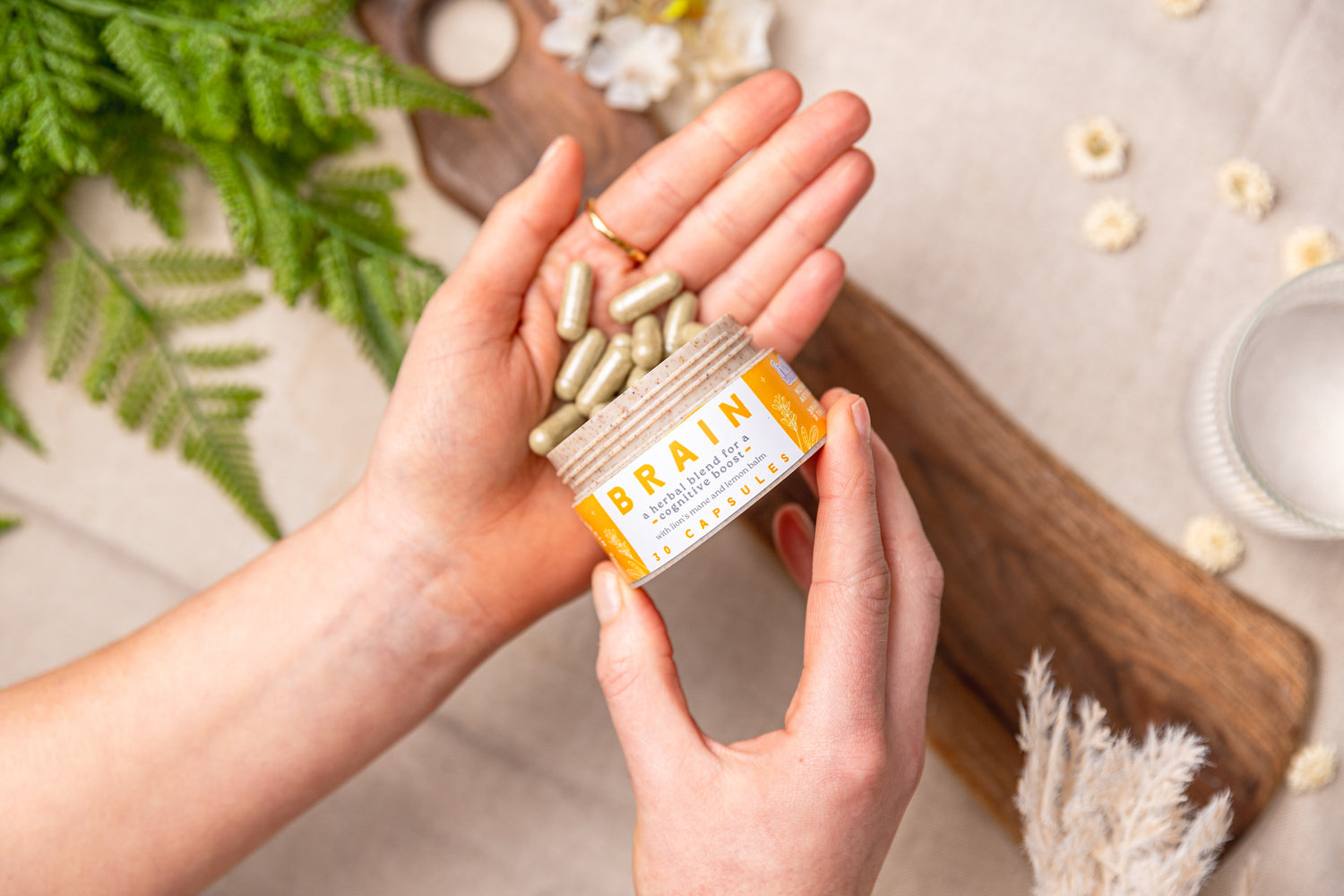
Clear the Fog with Hello Brain
If you’re tired of feeling mentally sluggish, it's time to take control of your brain health. Simple lifestyle changes, the right diet, and natural supplements can help restore clarity and focus.
At Hello Wellness, we believe in the power of nature to support brain health and cognitive function.
Hello Brain is our brain-boosting formula. It's an expertly crafted herbal supplement designed to help you stay sharp and energised throughout the day.
Start your journey toward mental clarity today.
Hello Wellness UK
Hello Brain
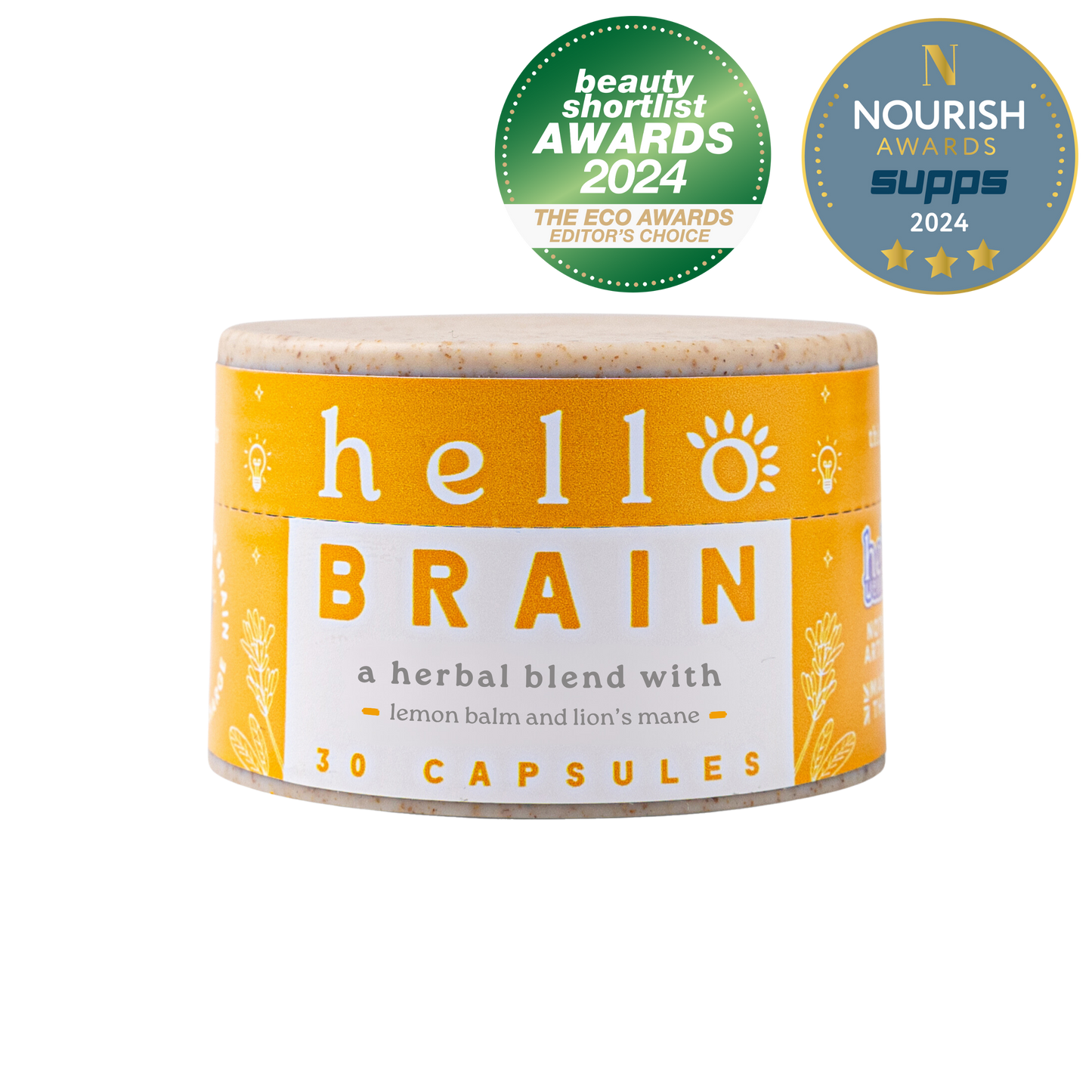
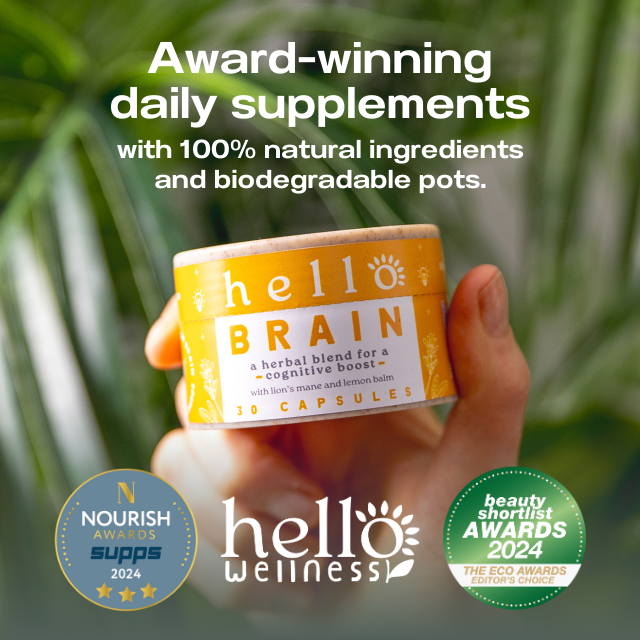
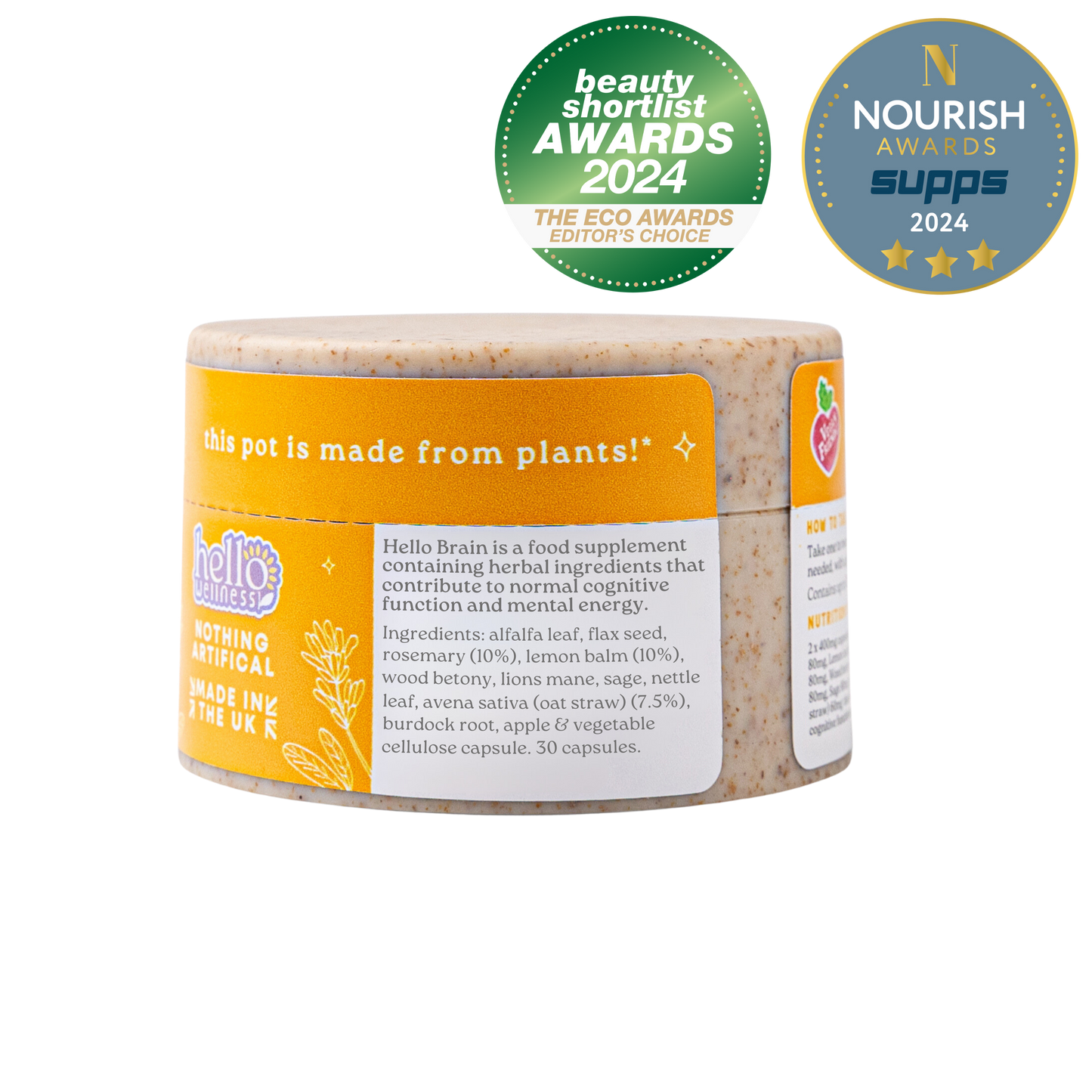
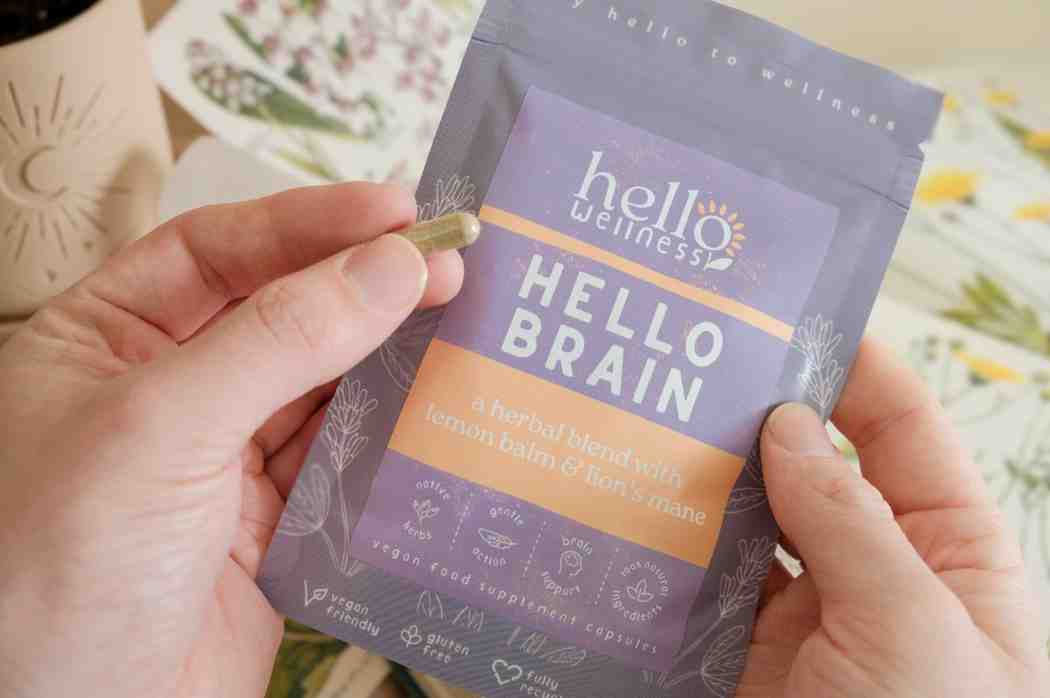
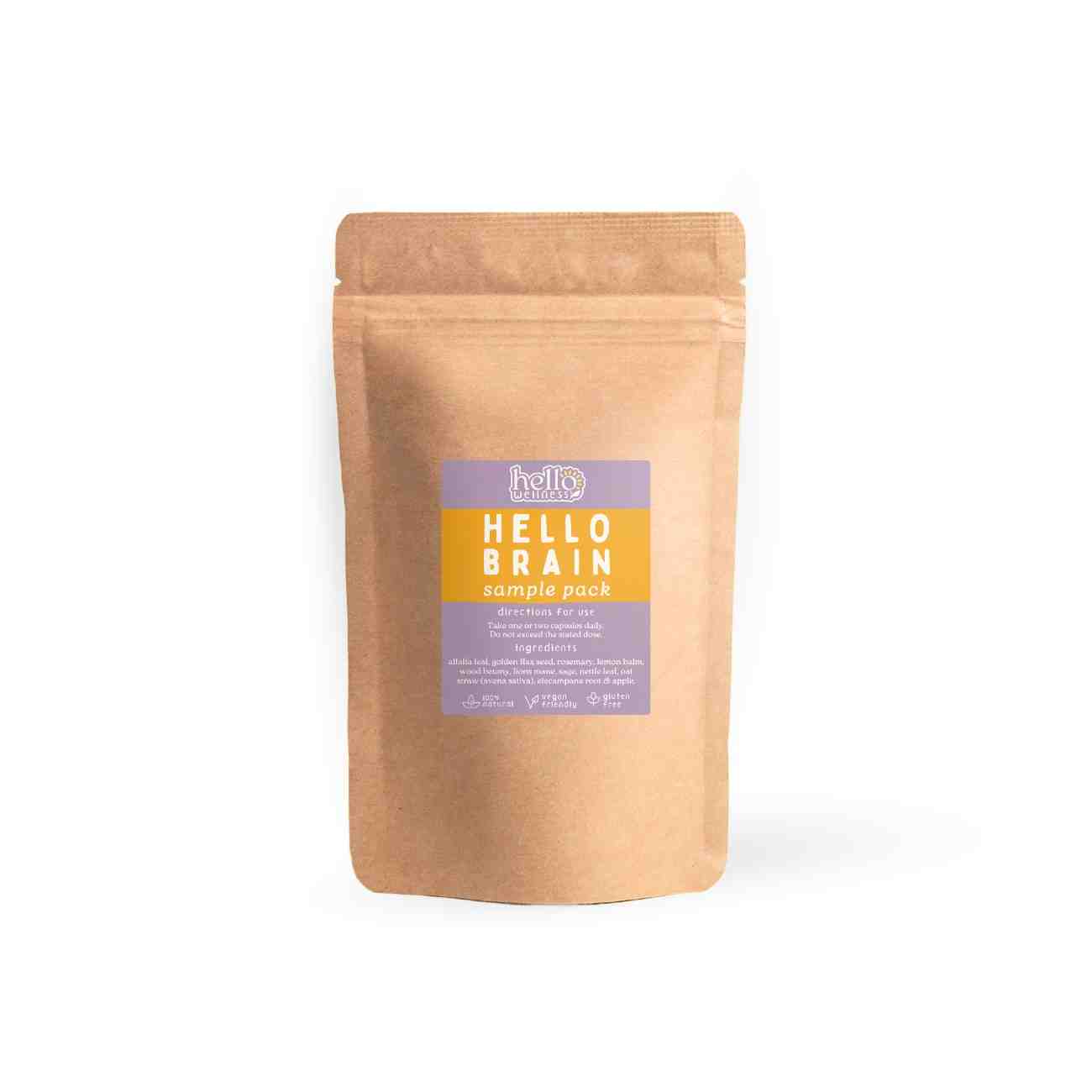
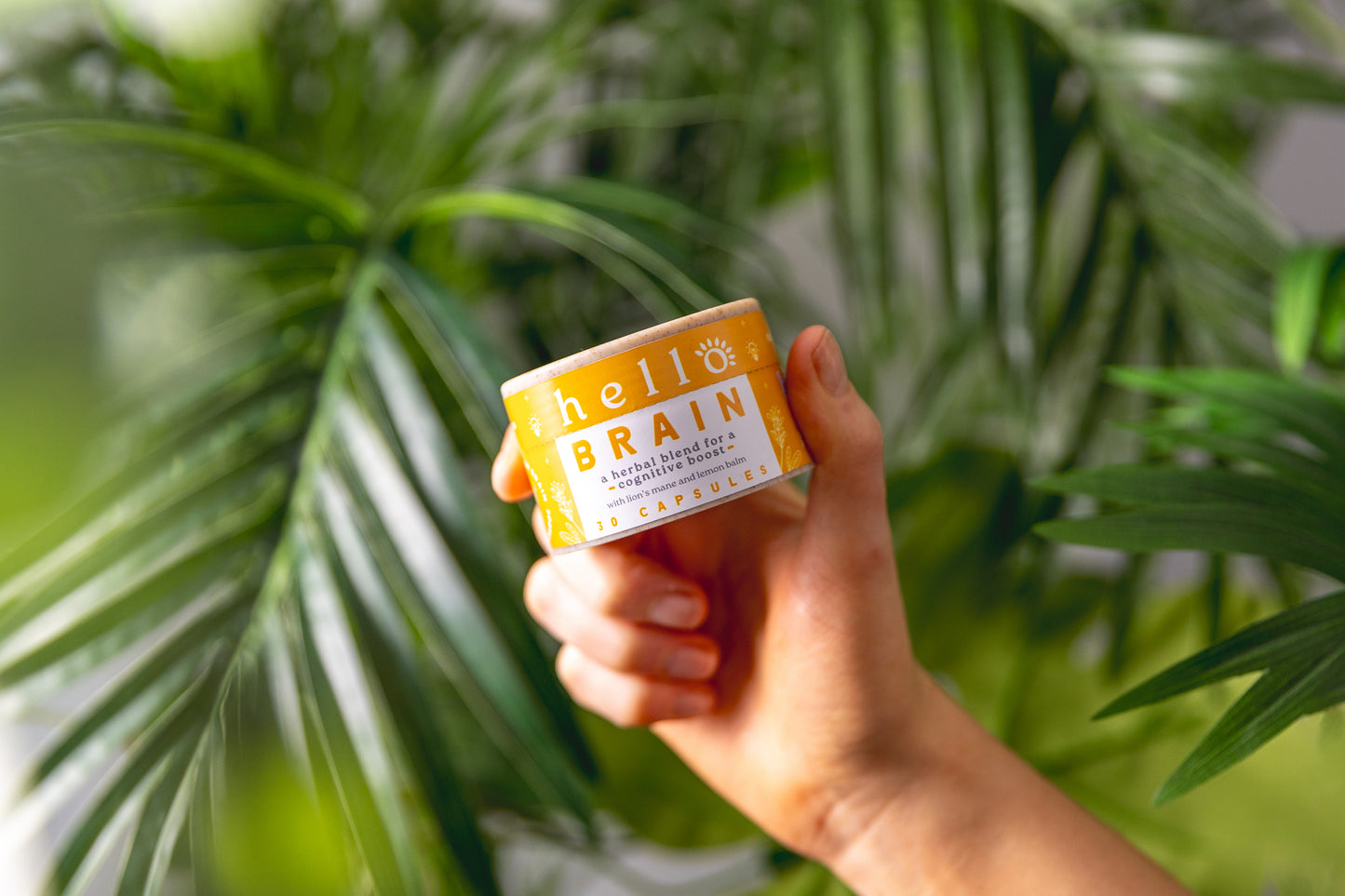
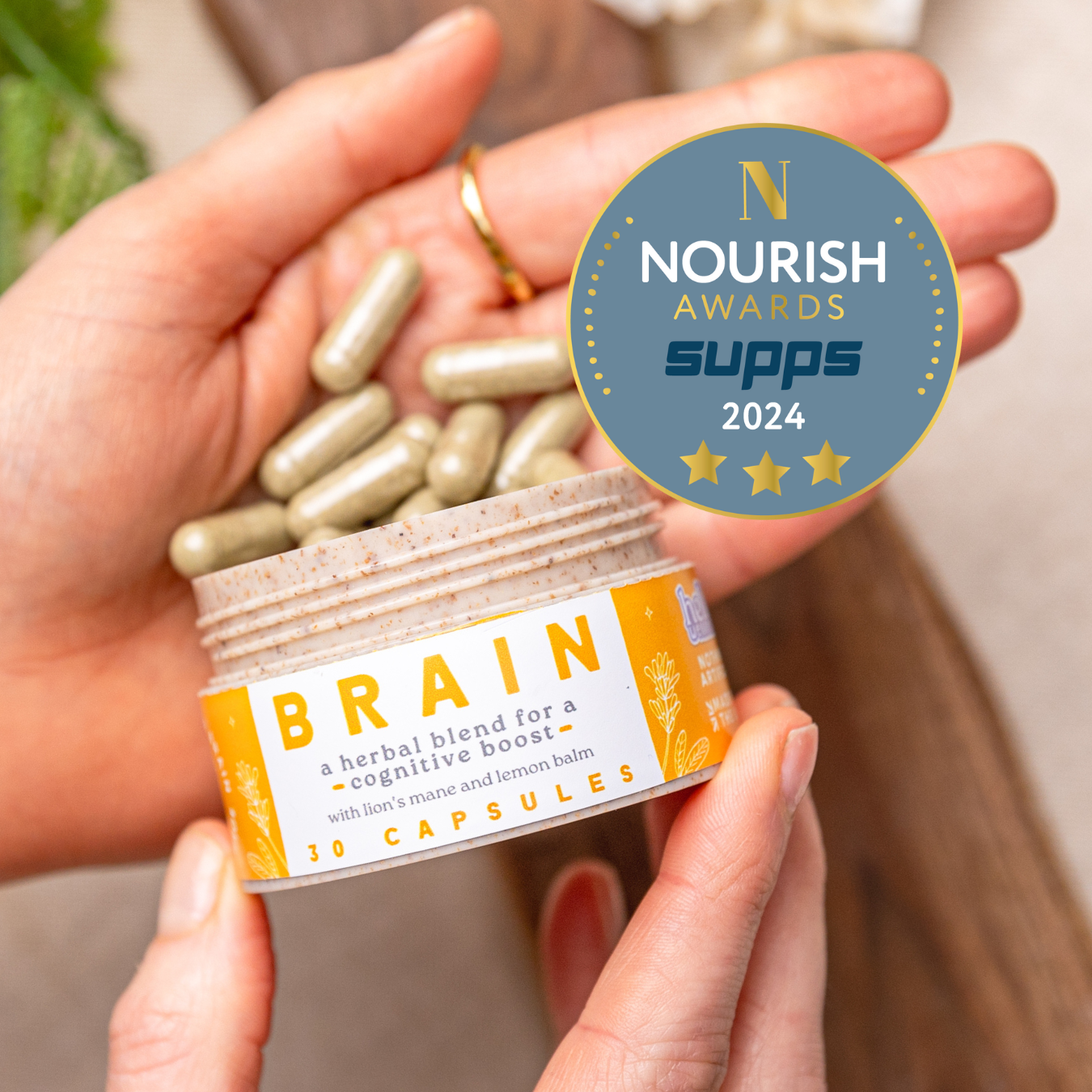
-

100% Natural Ingredients.
No artificial chemicals, no fillers, just herbs native to the UK.
-

Naturopathically Formulated.
Unique combinations of active ingredients and adaptogens refined throughout our natural health practitioner & founder’s 25 years of experience.
-

For Everyone.
Everybody and every body is different. Our active ingredient and adaptogen-filled formulations listen to deliver what it needs, when it needs it.
-

For the Planet.
Choosing Hello Wellness is choosing sustainably-sourced UK native herb varieties, and award-winning biodegradable pots.









